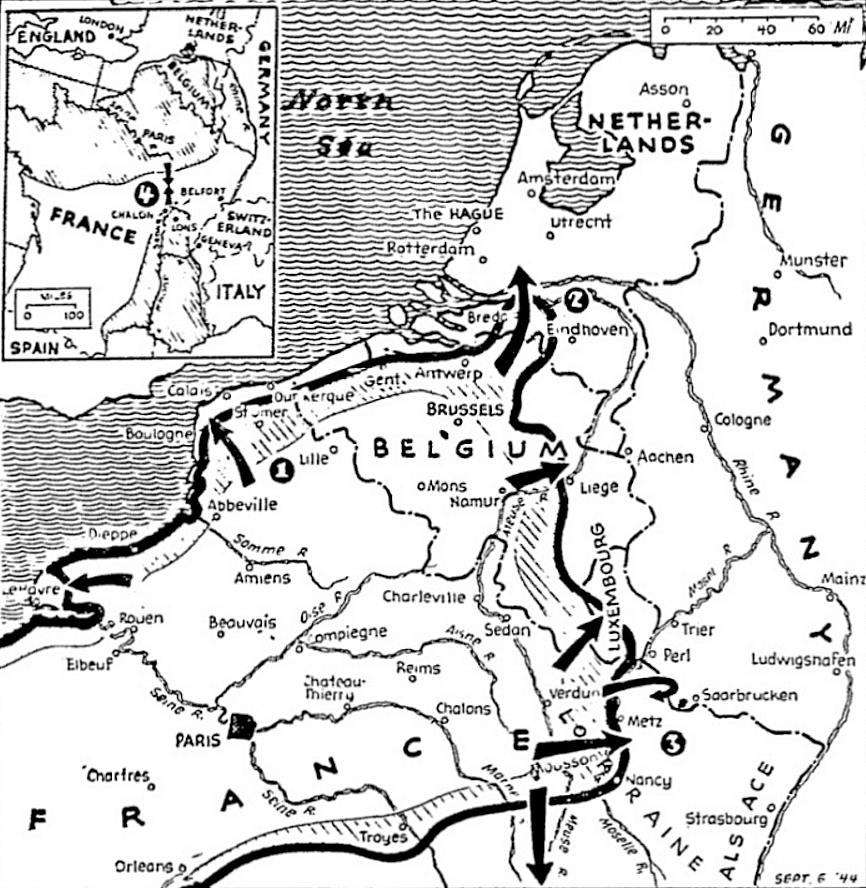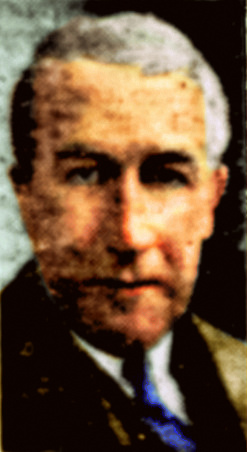The Pittsburgh Press (September 6, 1944)
PATTON MASSES THIRD ARMY FOR SIEGFRIED LINE SMASH
U.S. patrols stab into Germany
Moselle defenses cut by Yanks; Allies close on Channel ports
By Virgil Pinkley, United Press staff writer
Nazis stand and fight

The first action in the Battle of Germany was reported today along the borders of the Nazi Rhineland. As Canadian troops battled hard to capture the Channel ports (1), U.S. and British troops drove toward Rotterdam (2). Gen. George S. Patton’s U.S. 3rd Army crossed the Moselle River (3), apparently in the Mousson area, and U.S. patrols crossed the German border and then returned, presumably in the region near Metz. Junction of U.S. forces in northern and southern France (4) was reported as Allied troops advanced north in the Saône Valley.
SHAEF, London, England –
U.S. combat troops have invaded German soil for the first time in history at an undisclosed point and have smashed across the Moselle River in a drive toward the Siegfried Line which a staff officer said today the Allies “of course” can break.
U.S. patrols stabbed across the German border into the Nazi homeland and returned to France after a scouting mission a Lt. Gen. George S. Patton massed this 3rd Army for coming blows at the Siegfried Line. Only after the armistice did Americans cross the German borders in the last war.
On the opposite wing of the Western Front, the battle of the Channel ports whirled toward a climax. Canadian troops reached the coast on both sides of Calais, clamping a pincer on the town, swarmed into the outskirts of Boulogne, and struck within 20 miles of Dunkerque.
United Press writer Robert C. Richards reported from the 3rd Army front that German resistance had stiffened as the Americans burst through the Moselle River line, apparently in the Pont-à-Mousson area midway between Metz and Nancy.
Supreme Headquarters cautioned against taking the patrol thrust into Germany to mean that the assault on the Nazi homeland had begun. A headquarters broadcast to foreign workers in Germany, however, said that “the collapse of the German armies in the west means that battles soon will be fought on German soil.”
Coincident with the official assertion that Gen. Patton’s operations were still in the buildup stage and encountering increased resistance, a senior staff officer made the unequivocal statement: “Of course, the Allies can break the Siegfried Line” – the primary defense belt of Germany proper.
Lacking official information, it was believed the American frontier crossing was made somewhere in the area of Thionville, just south of Luxembourg.
Hurdle last barrier
By forcing the Moselle, the Americans hurdled the last river barrier west of the German frontier. Ahead of them was no major obstacle to interfere with a full-dress push into Germany and the Siegfried defense zone.
Far behind the fighting front, the German garrisons of Brest and Le Havre were still holding out despite heavy bombing. Another ultimatum was delivered to the Le Havre garrison today after Royal Air Force heavy bombers saturated the force of some 5,000 diehards with more than 1,200 tons of bombs late yesterday.
About 300 Marauders and Havocs of the U.S. 9th Air Force hit Brest again today, attacking in 16 waves for an hour. The bombers hit gun positions, strongpoints and ammunition dumps in the fifth strike at the base since Sept. 1.
The Canadians reached the outskirts of Boulogne after an advance in the face of artillery fire. An estimated 5,000 Germans were manning the Boulogne defenses.
At the same time, other Canadian elements swung inland around Boulogne and reached the coast on each side of Calais. It was possible that the column east of Calais would continue along the last miles of the coast road to Dunkerque.
Some 50,000 Germans were pocketed along the Channel coast by the Allied thrust into Holland.
Capture 14,000
Headquarters revealed that the mop-up of a big pocket southwest of Mons had yielded 14,000 prisoners and the total might go considerably higher. The cleanup of the pocket was essential to the advance of the U.S. 1st Army since it was too big to leave indefinitely. The 3rd Army was reported to have taken 76,000 prisoners and killed 19,500 Germans.
The Nazis appeared to be trying a major stand in defense of the fatherland along the Moselle River line, which runs into the Reich at the Luxembourg border and curves away to a distance of about 40 miles in the area east of Nancy.
The rout of the German armies in the Low Countries was in full swing, as units of the U.S. 1st and British 2nd Armies linked up beyond Antwerp to drive an armored wedge deep into Holland. Unconfirmed reports said the Allied columns were across the Rhine estuary within sight of Rotterdam after an advance of almost 60 miles from Antwerp.
Flee in disorder
Front reports said the Nazis were fleeing in wild disorder, with thousands surrendering daily as Allied troops cut across their line of retreat.
The breakthrough across the Moselle came after two days of hard fighting, during which the Germans poured a murderous rain of artillery and machine-gun fire down on the Americans from steep heights overlooking the narrow river.
Mr. Richards reported that the Nazis fought desperately for the crossing but the Americans drove across in force, established a firm bridgehead and pressed on to the east.
Lack official backing
Gen. Patton’s scouts were the first Americans officially disclosed to have reached German soil, although unconfirmed reports broadcast by the Paris and Swiss radios said U.S. troops had captured Aachen, just across the southeastern border of the Netherlands, and Saarbrücken, 38 miles east of Metz.
Neither report had official backing, and the seizure of Saarbrücken seemed highly improbably in view of the admittedly-stiff fighting in progress along the Moselle between Metz and Nancy.
The German Transocean News Agency said counterattacking Nazi troops recaptured Audun, 12 miles west of the Moselle and 21 miles northwest of Metz.
Third Army troops broke into Nancy yesterday and were believed to have cleared the last enemy resistance from the city this morning, and the Swiss radio said without confirmation that Gen. Patton’s men effected a juncture in central France with 7th Army troops advancing from the south. Fighting is in progress at the Belfort Gap, 90 miles below Nancy, the Swiss reports said.
Test underway
The first great test of Germany’s frontier defenses was underway in the Larraine Gap beyond the Moselle, however, and dispatches from the front said Gen. Patton was moving tanks, artillery and infantry up to the Moselle in force for a full-scale drive into the Reich.
The broad belt of fortifications in the Siegfried Line was believed to be strongly defended with heavy artillery, tank traps and hidden mortar and machine-gun nests, but headquarters spokesmen expressed confidence that it would be breached in short order.
The Germans, one source said, have suffered such heavy losses in the Battle of France that they no longer have the men to hold fortifications against the weight of infantry, armor and planes the Allies can throw against them.
Fan out in Holland
U.S. and British forces fanned out across the Netherlands against only feeble opposition, and Radio Paris said their vanguards were in sight of Rotterdam, Holland’s largest seaport, presumably after crossing the Rhine Delta beyond Breda.
British 2nd Army troops entered Ghent after a 13½-mile advance northwest of Alost, while headquarters confirmed the capture of Charleroi and Namur by U.S. 1st Army forces in southern Belgium. The 1st Army also crossed the Meuse at Dinant (14 miles south of Namur) and Givet (nine miles below Dinant).
‘Lay down arms,’ radio tells Nazis
By the United Press
An Allied appeal that Germans in the west lay down their arms was broadcast by the British radio today.
The broadcast was in German and was described as “official messages to members of the German Wehrmacht in the west.” One addressed to German officers said:
You know that the defeat of Germany is a military fact. To you the inevitable consequences of party politics are clear – the senseless deaths of thousands of your men and the destruction of German cities. You alone in Germany are now responsible. If these things are not prevented, you alone in Germany have the power and the authority to prevent them. Give orders to the soldiers under your command to cease firing.
The message to the troops said:
Your high-ranking officers know that the war is lost. Those among them who realize their responsibility have given orders to cease fire. Only those who are utterly desperate and the party fanatics insist that you have to sacrifice yourselves.
From today until the time when everything is over, which means the officials general capitulation, many German soldiers will go to their death. Why should you be one of them? The outcome of the war has been decided. You have done your duty as soldiers. Now you have duties at home.
In American or British prison camps, you will receive the decent treatment soldiers deserve. Over 300,000 of you have already surrendered, many of your generals and commanders among them.


